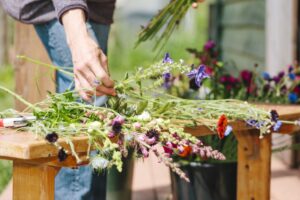 Foraging. The idea of living off the land in a remote cottage in the woods comes to mind when people hear this word. Yet, foraging is not just an activity available to individuals with big enough properties. Both the city and the suburbs are ideal foraging spots! This article looks at the meaning of urban and suburban foraging, the legalities involved, and how you can begin foraging in your location.
Foraging. The idea of living off the land in a remote cottage in the woods comes to mind when people hear this word. Yet, foraging is not just an activity available to individuals with big enough properties. Both the city and the suburbs are ideal foraging spots! This article looks at the meaning of urban and suburban foraging, the legalities involved, and how you can begin foraging in your location.
What is Urban Foraging?
Harvesting wild plants and mushrooms that are naturally found in your area is known as urban foraging or city foraging. A great number of these plants are either edible or can be used to create medicines or teas. For instance, you could eat the dandelions blooming in your local park, and you can roast or grind into flour the acorns that grow on trees throughout the city.
Young TikTok influencers and followers are getting into foraging. Tens of millions of people have seen social media foraging videos, and many internet users are using it to supplement their diets. And why shouldn’t they? Foraging is a great method to learn about nature and become more familiar with the world around you. Also, you may be able to bring home wild crops that haven’t been sprayed with pesticides or chemicals.
Is Urban Foraging Legal?
Plants, fruits, nuts, and wild mushrooms can generally be taken from public land without a permit. This would include riverbanks and creeks, parks, the grounds around the city buildings, walkways and sidewalks, and other available areas around urban or suburban environments. You can also utilize maps such as those provided by FallingFruit.org to identify foraging places in your area. Nevertheless, you should always review local regulations and ownership of property records. Some locations may restrict or prohibit certain foraging activities.
Moreover, it’s essential to respect the property owner’s rights and avoid trespassing on their land. If you initially inquire, some landowners might permit you to collect fruit, nuts, and other foods from their property. It’s possible that the local property owners, including your neighbors, have extra produce that they’d be keen to share.
How to Get Started
A thrilling and fulfilling activity you could do is urban foraging. For starters, you ought to learn what plants grow in that area by looking online or speaking with wild food enthusiasts, botanists, or local gardeners. To learn more about the plants you could encounter in your area, you might want to take a class on plant identification or join a neighborhood outdoor club.
It is critical to adopt ethical harvesting procedures that respect both the environment and other individuals who may be using the property as you head out. Unless it is freely provided to you and you intend to share it with others, never take more than is necessary for your own personal use.
A basket or reusable bag, paper bags (for mushrooms; plastic makes them slimy), pruning shears or a small knife, and small containers to keep your collected plants separate and prevent things from getting crushed are other basic foraging gear you might wish to invest in.
Lastly, resist harvesting in locations where chemical fertilizers or pesticides have been used. For example, farm fields, factories, orchards and other sources of runoff agriculture, as well as regions near heavy car traffic are contaminated with chemicals. Lawns or golf courses that are treated with pesticides should also be avoided. Ask your local authorities or the owner of the property if you want to know if an area has been treated. Fully wash all the forage harvest and prepare them safely before serving to stay safe.
Foraging can be a great way to engage with the environment, discover more about local plants, and even get free food! After learning where to start, you can forage in the city or suburb. Who knows, maybe there’s a forager’s gold mine waiting to be discovered in your own backyard!
Are you switching to a new place soon? Find excellent rental listings near you by reaching out to your local Real Property Management!
We are pledged to the letter and spirit of U.S. policy for the achievement of equal housing opportunity throughout the Nation. See Equal Housing Opportunity Statement for more information.


